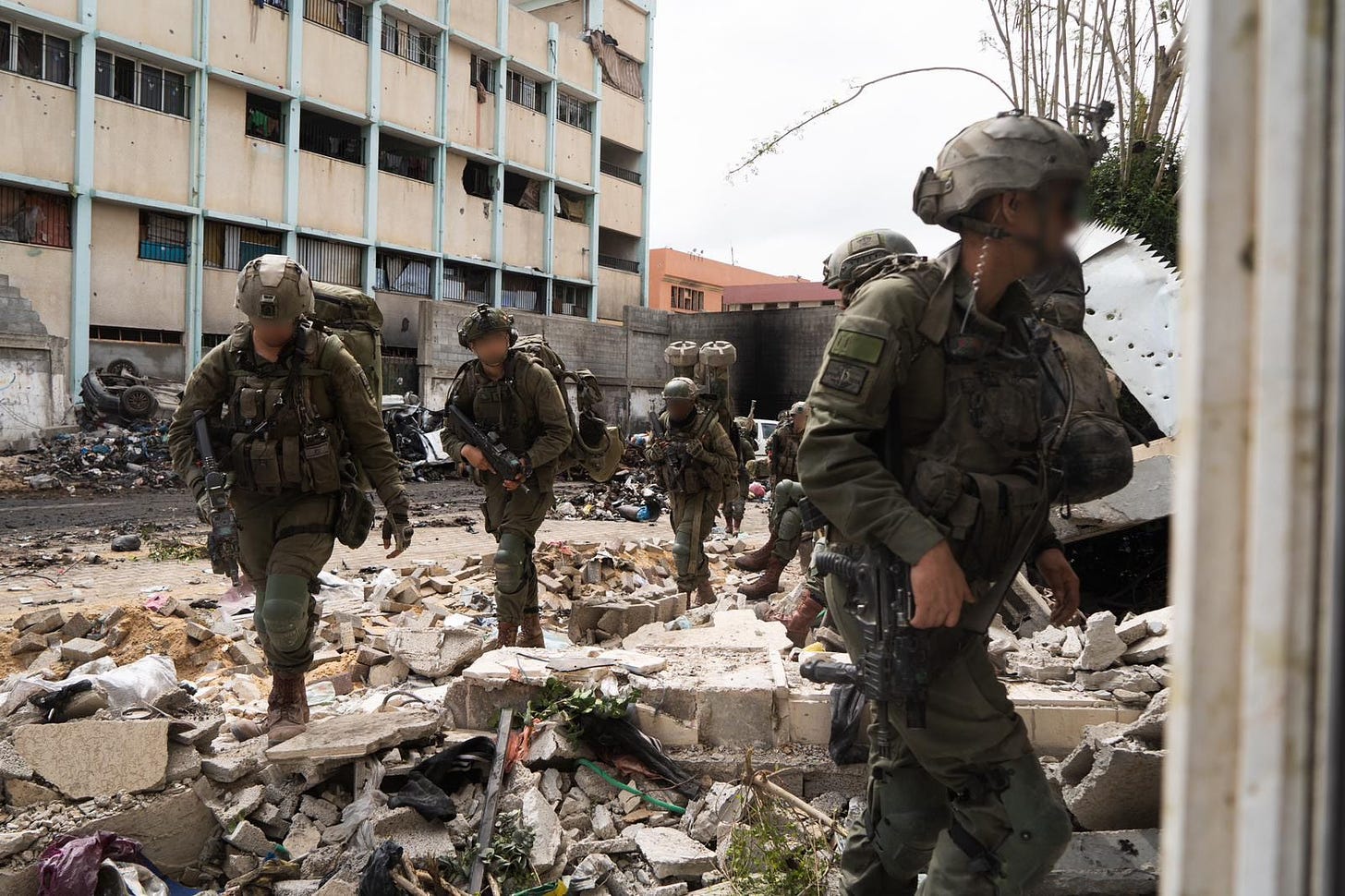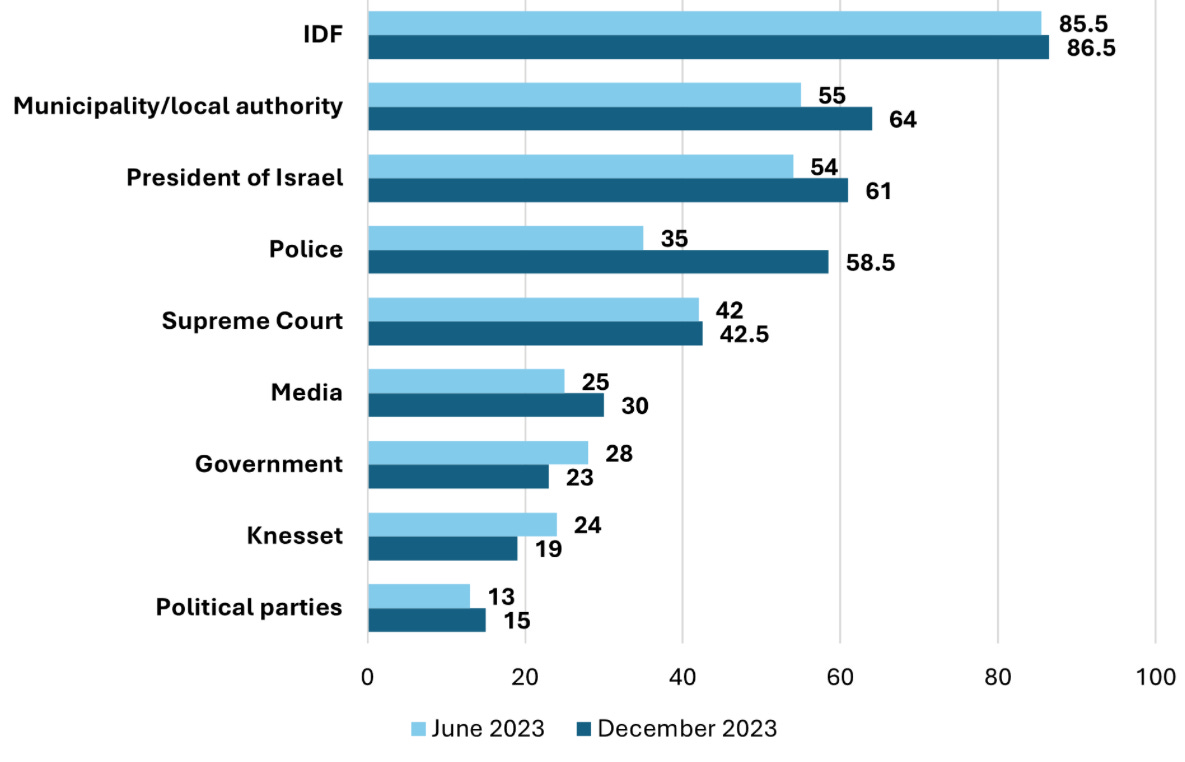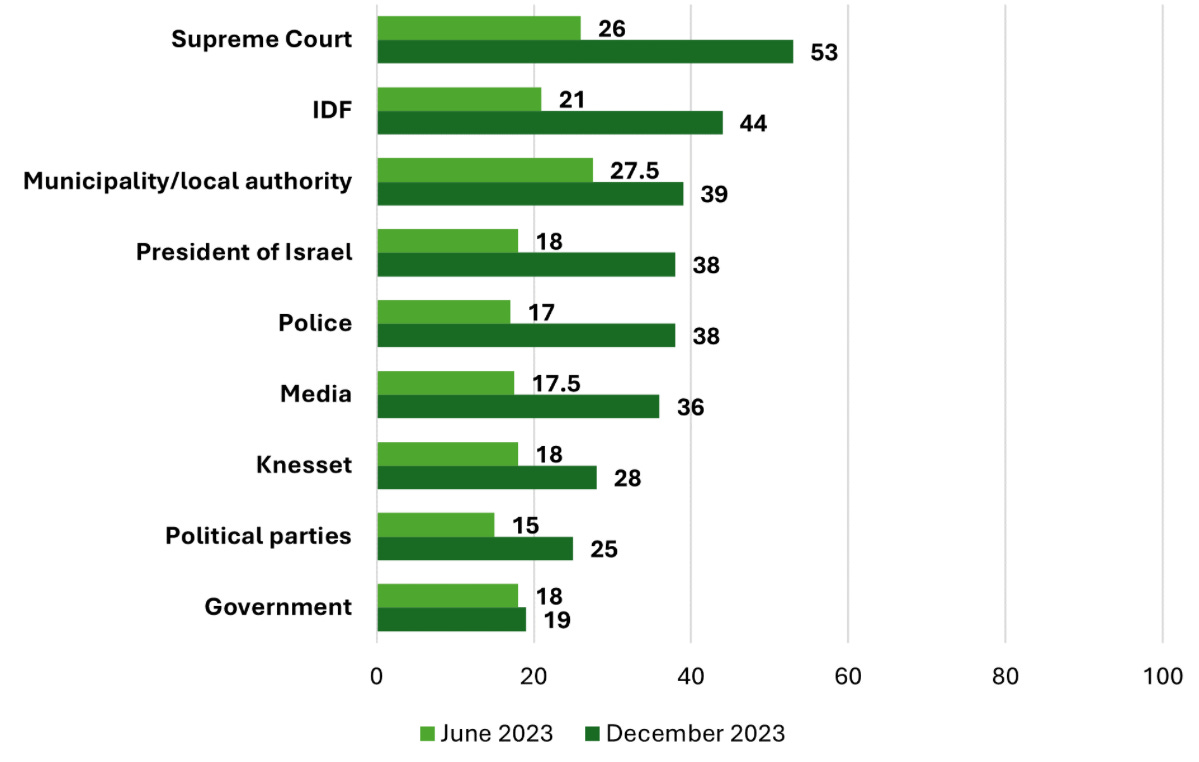DAY 165 OF THE GAZA WAR: Gaza-Shifa Hospital, Hostage Negotiations- Does Hamas Want a Deal? Famine in Gaza?
Tel Aviv Diary, March 19, 2024
IN GAZA
Today’s fighting in Gaza centered around two primary locations. The initial focus was on the continued clearance of Shifa Hospital. Unlike the first time the IDF arrived at Shifa, when only remnants of the terrorists were found, this time the army launched a surprise attack and immediately encircled the hospital, whose tunnel had been destroyed in the earlier operation.
During this return operation, the IDF took over 300 terrorists from both Hamas and Islamic Jihad into custody, including many mid-level commanders. Dozens of combatants were killed, and a wealth of munitions and intelligence materials were confiscated.It's believed that dozens of Hamas, if not more, who remain trapped within the hospital complex, and now face the stark choice of surrender or fighting to their death. One senior Israeli commander on the scene, expressed the IDF’s surprise by both the large quantity and calibre of prisoners they captured. The operation today resulted in the loss of an Israeli soldier, Warrant Officer Sebastian Haion, (51).
The IDF continues its slow combat operations within the Hemed neighborhood of Khan Younis.
[WHAT] FAMINE IN GAZA?
There has been a growing chorus of statements, regarding the looming threat of famine in Gaza. From the outset, both in these Israel updates and on TV, I have consistently maintained that Israel should be doing more to facilitate better food distribution in Gaza. However, there is a vast difference between acknowledging the need for more action and the ludicrous claims that Israel is deliberately starving the Gaza population — an assertion that is patently absurd and baseless.
Recent expressions of concern from President Biden and the UN Human Rights Chief, who suggested that Israel's use of food as a weapon could constitute a war crime, bring this issue to the forefront. However, it’s important to note that Israel is currently facilitating truck entries into Gaza with food supplies at a rate of 180% higher than pre-war levels — not to mention the latest additional sea and air shipments of supplies. While conditions in Gaza at the moment are undoubtedly dire for Gazans, the narrative of widespread starvation, does not align with any of the evidence available.
HOSTAGES
The Head of the Mossad has returned to Israel feeling less optimistic after the initial day of negotiations, than when he departed. He shared that Hamas is prioritizing the discussion and agreement on the return of all Gazans to the North — a stipulation Israel will find difficult to accept. Some Israeli analysts interpret Hamas’s insistence on this demand at the forefront as a sign they are not truly interested in reaching a deal. However, there are varied perspectives on this interpretation.
MISSILE ON EILAT
On Sunday, I wrote that an airborne object had crashed north of Eilat sometime between Saturday night and Sunday morning. My initial thought was that the object was merely a drone that had veered off its intended path, and there was no immediate need to shoot it down. However, it has since been revealed that the object was a cruise missile. The reasons why it wasn't intercepted and why no alerts were triggered in Eilat remain unclear.
CANADIAN HALT ARMAMENT SALES TO ISRAEL
Today, Canada announced that they are suspending the sale of military armaments to Israel. The impact is largely symbolic, given that Israel purchases little, if any, armaments from Canada. However, this action, coupled with the recent uptick in antisemitic incidents within Canada, tarnishes Israel’s image.
LEBANON
Today was a routine day of hostilities along the Lebanese border. A Hezbollah rocket that struck Manara, injured two Israeli soldiers. Lately, Israel has been concentrating its attacks on the border region between Lebanon and Syria.
RENEWED TRAVEL
Here’s a list of the latest airlines that have announced renewed round-trip service to and from Israel:
Azerbaijan Air
Start Date: March 19th
Frequency: 9 times a week
Destination: Baku
Price: $389
EasyJet
Start Date: March 25th
Frequency: Various
Destinations: Various locations in Europe
Iberia Express
Start Date April 1st
Frequency: 4 flights a week
Destination: Madrid
Current price: $949
KLM
Start Date: April 1st
Frequency: Daily
Destination: Amsterdam
Price: $1,103
Gordon Air
Start Date: April 3rd
Frequency: Daily
Destinations: Larnaca and Athens
Starting price: $299
Air Seychelles
Start Date: April 4th
Frequency: Weekly
Destination: Mahé
Current price: $1,678
Delta
Start Date: June 7th
Frequency: Daily
Destination: New York
Current price: $1,721
ISRAEL’S PR PROBLEM- IS IT A LANGUAGE ISSUE?
During a session of the Knesset’s Defense and Foreign Affairs Committee, Prime Minister Netanyahu was asked about the adequacy of our Hasbara (PR) efforts in the U.S. Netanyahu replied: “Obviously, they are not sufficient. The issue is not funding. But rather, it's a lack of capable personnel. You are surrounded by people who cannot string together words to make a sentence.”
It’s worth mentioning that this is the same Netanyahu who, for political reasons, appointed Ofir Akunis as the Consul General in New York — a person with a limited command of English, who is not known for original thinking.
ISRAEL DEMOCRACY INSTITUTE SURVEY
The Israel Democracy Institute recently released its latest survey on public opinion, revealing that in December 2023, the public's trust in various state institutions remained largely unchanged from June 2023. This consistency was observed both in the comparative rankings of institutions ranked against each other in the eyes of the public, and in their individual trust scores.
Jewish Israelis … By December, there was a slight uptick in trust levels compared to June. The IDF maintains its position at the top with the highest trust rating, averaging at 86%. Following the IDF were municipalities/local authorities, experienced an increase in trust from 55% in June to 64% in December. The President of Israel was not far behind, rising from 54% in trust to 61%, during the same timeframe. Notably, the Israel Police witnessed a significant boost in public trust, largely attributed to the officers' actions on October 7 and during the initial days of the conflict.
Conversely, amidst increasing criticism of Israel's political leaders, trust in the government and the Knesset saw a noticeable drop, with trust in the government falling from 28% to 23% and the level of public trust in the Knesset plummeting from the already very low 24% to just 19%. Trust in political parties remained largely unchanged, reflecting a stable level of public skepticism or support.
Chart
Arab Israelis … Historically, Arab Israelis have exhibited lower average trust in state institutions compared to the Jewish population. However, December witnessed a marked rise in trust among the Arab Israelis — a notable increase from the June 2023 figures. This uptick might reflect a reluctance to wartime to voice dissent during wartime, which could explain the surprising and unprecedented surge in trust towards the IDF, escalating from 21% in June to 44% in December. Alternatively, it could indicate a growing sense of belonging to the State of Israel within the Arab populace. In both survey periods, the Supreme Court was the most trusted institution among the Arab respondents, with its trust level dramatically increasing from 26% in June to 53% in December. Echoing trends observed in the Jewish public, the Knesset and political parties remained at the bottom of the trust spectrum for Arab respondents, albeit with a modest increase (from 18% to 28% for the Knesset, and from 15% to 25% for the political parties). Trust in the government showed remained largely unchanged.
BUSINESS
GitLab, a company offering a platform for open-source software development, is set to acquire the Israeli cybersecurity company Oxeye for about $30-40 million, as reported by Calcalist. This is GitLab's second acquisition in Israel, following its purchase of the company Fuzzit for a few million dollars. Oxeye did not respond to Calcalist's request for comment.
Oxeye was founded by Dean Agron (CEO) and Ron Vider (CTO, a graduate of Unit 8200). The company currently employs over 20 people. The proprietary system developed by the company for advanced security testing allows developers and security personnel to identify and address security vulnerabilities during the development process. To date, Oxeye has raised just over $10 million, including investments from Dell Capital, Intel Capital, Merlin Ventures, i3 Equity Partners, MoreVC, and others.
NeuReality, a company developing chips to accelerate artificial intelligence tasks in data centers, is looking to capitalize on the hype surrounding the field and announces the raising of an additional $20 million from the EIC Fund (European Innovation Council Fund). This fundraising is in addition to a round of $35 million completed by the company at the end of 2022. In total, since its inception, the company has raised about $70 million.
NeuReality was founded in 2019 by Moshe Tanach (CEO), Tzvika Shmueli (Vice President of Operations), and Yossi Kasus (Vice President of Chip Development). It developed a chip based on ARM architecture, which connects the AI accelerator in data centers directly to the network. This solution is expected to eliminate bottlenecks, streamline AI application operations, and reduce costs. The chip is called NR1, and it is defined as a “Network Addressable Processing Unit” (NAPU).
–––––∞–––––∞–––––∞–––––∞–––––∞–––––∞–––––∞–––––
A PIECE OF HISTORY
War of Independence, Pt. 1 — Civil War
The vote by the United Nations to approve the Partition Plan sparked celebrations across Jewish Palestine, as a long-held dream was nearing realization. Golda Meir, who would later become Prime Minister, addressed the jubilant crowds gathered in front of the Jewish Agency building in Jerusalem, saying:
For two thousand years we have waited for our deliverance. Now that it is here it is so great and wonderful that it surpasses human words. Mazel Tov!
While the approval of the Partition Plan was celebrated, many were acutely aware that the greatest challenge lay ahead. David Shatiel commander of the Haganah captured this sentiment in his diary entry on the night of the 29th, following the UN Partition Plan vote: “None of us knows what might happen tomorrow.”
The very next day, a Jaffa-based band of terrorists launched an attack on a bus carrying Jewish passengers. On December 5th, the British government announced its intention to withdraw all of their troops from the region by May 15th, adopting a stance of neutrality in the ensuing fight between the Jewish and Arab communities. Despite their declared neutrality, both sides expressed grievances about the British actions during this transitional period.
During December, many mixed areas saw population shifts and the establishment of clear demarcation lines. It is estimated that during this period 100,000 Arabs either left the country or left their homes in the mixed towns and went back to their ancestral villages.
At the beginning of January, members of the Arab Liberation Army, primarily consisting of Palestinians trained by neighboring Arab states, entered the region without British intervention. On January 10, they attacked the settlement of Kfar Szold, but were repelled. Jewish settlements throughout the country became isolated, necessitating significant efforts to provide them with supplies.
Even Jerusalem faced immense challenges in receiving supplies. One particularly famous and tragic event was the effort to reinforce the settlements of Kfar Etzion near Jerusalem, which had been severed from Jewish forces. A platoon of 35 soldiers was sent dispatched on foot to bolster the Etzion bloc settlements. En route, the force was detected and ambushed — resulting in the death of all 35 of the soldiers. This force became posthumously known as the “Lamed Hay” (35 in Gematria).
By March, the momentum of battle seemed to be shifting against the Jews. The crucial access route to Jerusalem had become impassible. During this period, Jewish forces adopted a predominantly defensive posture, only undertaking offensive operations on a local basis. These military setbacks led to a wavering of support from the United States for the Partition Plan. America’s UN Ambassador, seemingly acting without President Truman’s approval, proposed a postponement of the Partition Plan, in favor of placing Palestine under UN trusteeship.
As the situation deteriorated, Ben Gurion demanded that the military adopt an offensive strategy to clear the route to Jerusalem. This shift became feasible thanks to the successful smuggling of large quantities of small arms into the country. For the first time, troops were fully equipped, without the need to share rifles and machine guns.
The first major offensive, called “Operation Nachshon,” aimed to establish a corridor along the road to Jerusalem, and thus secure this vital route. The key battle along the road was the fight for Kastel, which Haganah forces won after intense combat on April 10. During the battle, Abd al-Qadir Husayni, the mufti military leader, was killed. This effectively ended the involvement of the Mufti's forces in the war. While the capture of the Kastel was a critical achievement, the operation’s broader objectives included taking control of all the Arab villages that served as bases for forces attacking the convoys to Jerusalem.
The attack on Deir Yassin, a village on the outskirts of Jerusalem, was assigned to the Irgun, under the command of Menachem Begin. The operation which took place on April 9th, encountered fierce resistance, culminating in intense house-to-house combat, which included indiscriminate attacks on houses that were inhabited by women and children. This fighting resulted in the deaths to 100-120 villagers, fatality numbers that were swiftly exaggerated in subsequent reports. However, the impact of Deir Yassin extended far beyond the immediate tactical victory over one village, or the tragic deaths of 120 people (at least half of whom were combatants). The exaggerated stories of the day spread became increasingly lurid and triggered widespread panic among Arab villagers throughout the area— which prompted an increasing number to abandon their homes and flee.
An immediate result of the Deir Yassin attack was a retaliatory strike against a Jewish medical convoy of doctors and nurses heading to Hadassah Hospital on Mt Scopus. Typically escorted by the British, the convoys found itself without protection on April 13th, as no British escort showed up. Despite the absence of an escort, The convoy set off without one and as the convoy proceeded, only to be halted by a mine explosion that obstructed their advance. While some vehicles managed to retreat to West Jerusalem, two armored buses and two escort vehicles were left trapped. For five hours, the trapped force was able to fight off the attackers, without any assistance from the British, who refused to help. Eventually, their ammunition ran out, allowing the Arabs to advance on the buses douse them in gasoline, and set them afire. Tragically, 78 individuals, including professors doctors, nurses and patients were all burned alive in the blaze.
In the North, the Arab Liberation Army, commanded by Fawzi al- Kawukji, launched a concentrated assault on Mishmar Ha'emek, but was ultimately defeated. Following this setback, the forces had to retreat to Jenin. This defeat destroyed the morale of the Arab villages in the area, leading to a mass exodus of their inhabitants.
In mid-April, the Haganah launched operation Yiftach, whose goal the liberation of the upper Galilee. On April 18, the Palmach took control of Tiberias. By April 21, as the British withdrew from Haifa proper, concentrating their remaining troops in the port area, the Haganah swiftly won the brief battle for the city. By May 10, the Haganah had taken control the Arab sectors of Safed, and by May 16, Akko was captured. On May 13, Jaffa was captured, as well.
On the Jerusalem front, the Palmach successfully seized most of the major British strongholds in the city. However, on May 14, the Etzion bloc succumbed to attackers from the Arab Legion.
The days leading up to independence marked a time of the successful consolidation for the Jewish forces. All of the areas allotted to the Jewish State in the Galilee were firmly under Jewish control, as well as some areas designated for the Arab State. The coastal plain and Jewish Jerusalem were both secure, although the access route to Jerusalem and numerous isolated settlements in the South remained significant concerns.







